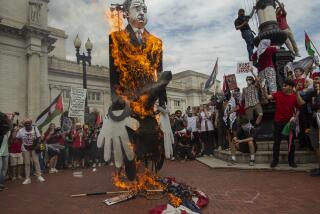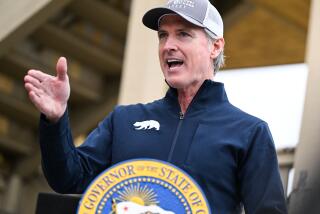Column: In praise of those anti-NRA boycotts
The corporate marketing partners of the National Rifle Assn. have been dropping like flies. In the weeks since the Parkland, Fla., massacre, more than a dozen companies have pulled out of agreements offering NRA members discounts or other perks.
What’s behind this trend, at least in part, is a campaign on social media threatening boycotts against consumer companies that continue their relationships with the gun-rights lobbying organization. That has revived debate over whether such boycotts are (1) effective, (2) fair and (3) proper.
A glimmer of the debate could be found on Twitter this weekend in an exchange between Rick Hasen, an election law expert at UC Irvine, and Jonathan H. Adler, a law professor at Case Western Reserve University.
Isn’t calling for a consumer boycott ... protected 1st Amendment activity?
— Rick Hasen, UC Irvine School of Law
Adler, who was last seen trying to nullify the Affordable Care Act based on a minor drafting error (his argument was slapped down by the Supreme Court), called secondary boycotts “corrosive of civil society.” Hasen responded that “far from corrosive,” such boycotts “allow opposition to noxious ideas in a peaceful and productive way.”
He added: “Isn’t calling for a consumer boycott and urging private companies not to do business with groups consumers find objectionable protected First Amendment activity?”
In the labor field, a secondary boycott is one a union aims at neutral parties doing business with an employer with which it has a dispute. The objective, of course, is to goad those parties into stepping up pressure on the employer to settle. Secondary boycotts are illegal under labor law, but as Hasen implied, generally legal.
But are they fair, or just?
Sure they are. And in the context of American politics — especially gun politics — they’re essential.
Let’s examine the anti-NRA campaign, which has acquired the Twitter hashtag #BoycottTheNRA. Its target is companies that made themselves complicit in NRA policies by offering benefits to NRA members. These have included discounted airfares for travel to NRA conventions, discounted rental car fees and hotel rates, and co-branded credit cards.
They’ve existed because consumer companies reckoned that access to the NRA membership was marginally more valuable to them than any association with NRA policies. Plainly, that calculation has been turned on its head by the Parkland shooting and the NRA’s unhinged response to it, which boils down to inflexible resistance to any gun-control measures and advocacy.
These withdrawals won’t cut directly into NRA revenues. The organization gets about half its income from member dues, and the rest from outside contributions, the vast majority of which reportedly come from gun companies.
Still, the boycott campaign has helped to raise the social unacceptability of association with the NRA greater than the business gains. (Doubts about whether the NRA actually has the 5 million members that it currently claims may also contribute to the trend.) Among the companies that have ended their deals with the NRA are Delta and United airlines; the parent of car rental agencies Enterprise, National and Alamo; the parent of Avis and Budget; Hertz; Allied Van Lines; and Best Western Hotels.
That must sting. The NRA has responded truculently by slathering itself in “patriotism” and wrapping itself in the flag. “Some corporations have decided to punish NRA membership in a shameful display of political and civic cowardice,” the organization says. “In time, these brands will be replaced by others who recognize that patriotism and determined commitment to Constitutional freedoms are characteristics of a marketplace they very much want to serve.”
Critics and skeptics of the NRA boycott point out that such campaigns are often ineffective, and can target not merely wrongdoing groups, but innocents. Adler, for example, argued on Twitter that secondary boycotts reflect “the mind-set that led Christians to refuse to buy from Jews/infidels/sinners” and that “tolerance for differing views and ideals is better all around, especially for minority groups.”
Yet there are obvious distinctions between campaigns against groups that are already disadvantaged, and the NRA and its clutch of gun-rights absolutists. The latter are not only the antithesis of a downtrodden group, but one that arguably has far more influence than its numbers or positions justify.
The NRA’s outsized weight in the country’s politics derives in part from its enormous campaign spending — a record $54 million in 2016, including $30 million to elect Donald Trump. If you wish to see how this torrent of cash affects gun-rights politics, then watch Sen. Marco Rubio (R-Fla.) squirm about it under questioning by a Parkland student at a recent CNN town hall.
Meanwhile, according to a recent CNN poll, an overwhelming majority of Americans favor gun-control politics opposed by the NRA.
As for the effectiveness of these boycotts, plainly they can work. It’s true that individual boycotts can be limited in effectiveness, as social commentator Mark Oppenheimer has observed. But he acknowledged that when yoked to the right cause, they can become landmarks of social activism, such as the Montgomery, Ala., bus boycott in 1955-56.
Boycott campaigns can have an informational impact, by giving the public a focal point. The state of Indiana and its then-governor, Mike Pence, discovered that in 2015, when Pence signed a law allowing open discrimination against LGBTQ people. The threat of travel bans and cancellations of events and business ventures by dozens of companies and other groups prompted the state to amend the law within days. Something similar happened in North Carolina, where Republicans passed a bill in 2016 narrowing LGBTQ civil rights protections; boycotts eventually cost the state billions of dollars, leading it to rescind the law last year.
That’s an indication that economic pressures can outweigh contributions from special interests in forcing legislators to act.
That could be germane in Florida, where the state Legislature figuratively spit in Parkland students’ faces by refusing even to consider tightening the state’s egregiously lax gun-control laws in the wake of the shooting. Some of those students are proposing that businesses boycott Florida until the Legislature changes its stance.
“These politions won’t listen to us so maybe they’ll listen to the billion dollar tourism industry in FL,” Parkland student David Hogg tweeted Saturday. Hogg gets it. Will the Florida Legislature?
Keep up to date with Michael Hiltzik. Follow @hiltzikm on Twitter, see his Facebook page, or email [email protected].
Return to Michael Hiltzik’s blog.
More to Read
Inside the business of entertainment
The Wide Shot brings you news, analysis and insights on everything from streaming wars to production — and what it all means for the future.
You may occasionally receive promotional content from the Los Angeles Times.











